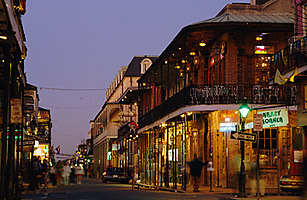
New Orleans, La.
When Hurricane Katrina devastated New Orleans and much of the surrounding Gulf Coast in 2005, some of the more dire observers suggested that the blighted city might not even be worth rebuilding. "Only a sadist would insist on resurrecting this concentration of poverty, crime, and deplorable schools," wrote Slate's Jack Shafer, a week after the hurricane hit Southeast Louisiana.
Nearly seven years later, not only is New Orleans' population back on the rise, but the state is aggressively courting small businesses with generous tax credits that effectively refund up to 40% of their startup costs. While Louisiana's recovery is by no means complete — it's still one of the poorest states in the nation and New Orleans' Lower Ninth Ward remains a ghost town — a new culture of entrepreneurship is taking root not just in the Crescent City, but in other urban pockets around the state as well. "For people who want to be a part of building something, there is absolutely no better place to be," says Taylor Beery, a New Orleans native who launched his group decision-making startup, VoteIt, in March 2011, and has raised $800,000 in funding since then.
Before Katrina, "New Orleans had been in a continuous state of decline for 50 years," says Stephen Moret, secretary of economic development for the state. "Today there is this incredible renaissance," he notes. According to research from the Kauffman Foundation, entrepreneurship in the state is 46% higher than it was a decade ago, with 410 out of every 100,000 adults creating new businesses there each month. The Bayou State now ranks seventh in the nation in entrepreneurial activity, up from 24th place between 1999 and 2001.
"Up until now we've had the wrong type of entrepreneurs. Everyone wanted to open up a bar or a restaurant," notes Arman Sadeghpour, whose biotech startup, Theodent, has benefitted from the new incentives. But that's starting to change. A high-tech sector is flourishing in New Orleans, the state's filmmaking industry is now the third largest in the country (after Los Angeles and New York), and even outside-the-box startups like Sadeghpour's Theodent, which makes a toothpaste that contains a cavity-fighting chocolate extract instead of fluoride, are sprouting up
Many factors play into Louisiana's business revival, including the low cost of living and increased federal subsidies post-Katrina, but "the state tax credit is definitely one of the top reasons why you would want to start a business in Louisiana," says Chris Schultz, whose technology accelerator, Launch Pad Ignition, backs promising entrepreneurs.
According to the state's economic development office, the estimated $300 million that Louisiana spent in 2011 on tax incentives for businesses of all sizes has helped to create nearly 40,000 new jobs.
Starting Out in The Big Easy
New Orleans in particular has become a hub for incubating new businesses. "Before Katrina, there was not an ecosystem to fund entrepreneurs," says Tim Williamson, founder of The Idea Village, a New Orleans non-profit that has provided support and helped raise more than $3.1 million in funding for 1,654 startups in the city since 2002. "Today New Orleans has one of the most vibrant, engaged networks in the country," he adds. At the group's annual Entrepreneur Week in mid-March, 58 startups vied for $325,000 in cash prizes, up from $183,000 in 2011.
While many New Orleans startups have a high-tech bent, they run the gamut from education to the environment, to, you guessed it, alcohol: A winner at the 2010 Entrepreneur Week, Cordina Frozen Cocktails, which sells single-serving margaritas and daiquiris in to-go packaging, had $5 million in revenue in 2011. During this year's Entrepreneur Week, Kickboard, an online system that helps teachers evaluate students' performance and behavior, won a trip to San Francisco to meet with potential investors. SOLarchitect, makers of a web application that lets homeowners calculate the viability of installing rooftop solar panels, took home the $50,000 "Big Idea" prize, which was crowdfunded by Entrepreneur Week attendees, who also got to pick the winner.